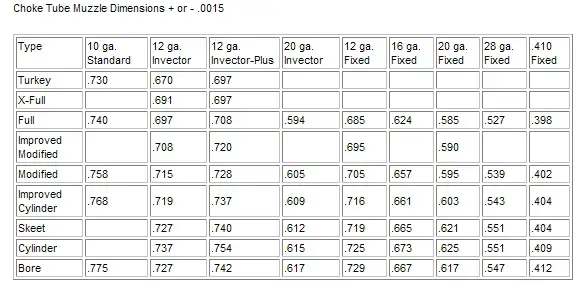


Why Shotgun Chokes Can Bewilder and Mislead
I
just measured three Browning 20 gauge barrels at random with a Skeets
bore gauge. They measured .614 inch, .618 inch, and .624 inch inside diameter.
All three barrels were standard barrels that have a published spec of
.617 inch, +/- .0015 in. None were on the money, two out of three were
way out of published tolerance. (Invector Plus 20 gauge barrels are
supposed to be .630 in. nominal, by the way.) This isn't uncommon,
regardless of the brand of shotgun. While the notion of choke is pattern
percentage based, not based on dimension, decreasing choke exit diameter
tightens patterns.

A 20 gauge skeet choke is .615 inch exit diameter from several chokemakers. Yet, screwing that “Skeet” choke into the .614 inch barrel gives you essentially no choke effect. In the .618 in. barrel it would be in the range of a skeet choke, but in the .624 inch barrel it would be approximately in the “Improved Cylinder” range. This same issue is present regardless of what pattern you are trying to throw. A .015 in. constriction choke is theoretically a “Modified” or “Light Modified” choke. Yet, when your barrel is off by ten thousandths of an inch, you don't have near the choke you assumed you had, so it shouldn't be all that surprising when your so-called Modified choke acts like a skeet choke.
This ten thousandths variance, a full notch size, can be even worse. OEM
chokes vary all over the place, with several “Modified” marked
tubes actually having larger exit diameters than their “Improved
Cylinder” counterparts. If you want to save yourself some time and
hassle, know what your barrel actually measures and know what your choke
tube exit diameter is before starting out. You may well not have any constriction
at all, or conversely . . . you might have far more than assumed. While
it is currently trendy to call choke designations a constriction, there
is no such thing without verification of the inside diameter of your barrel
and the exit diameter of a specific choke tube. Only then do you have
a constriction dimension, the difference between these two inside diameters.
Copyright 2011 by Randy Wakeman. All Rights Reserved.

Custom Search

Custom Search



